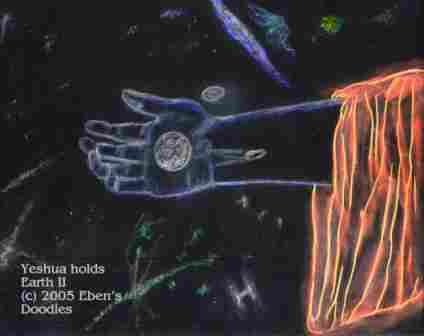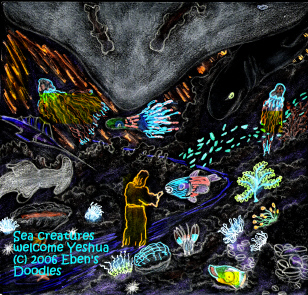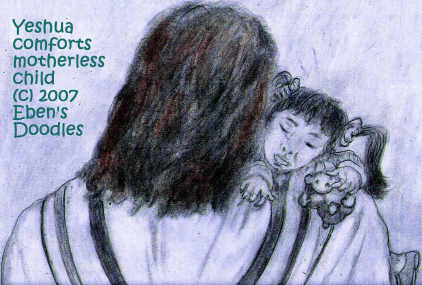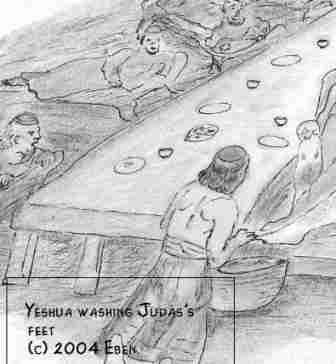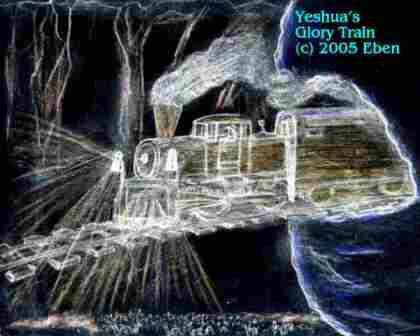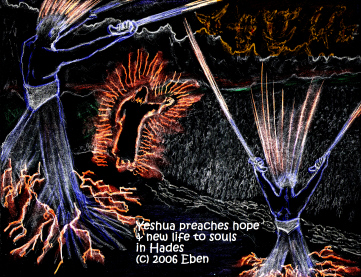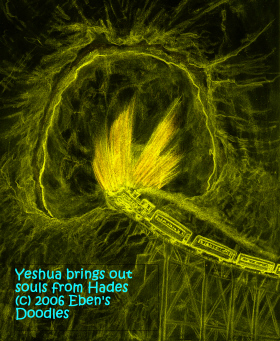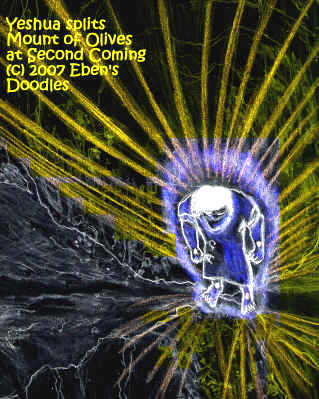

Chronicle Sixty-One,
Anno Stellae

"No! Master, you alone must go! We will remain here to hold the area until you are safely away!"
The prince could not dissuade them, try as he might. The shishi slammed the outer hull's double-hatched door, and it automatically sealed him in.
There was no time to lose, as the enemy was returning to the launch site, eager to intercept the prince.
The hearing and speaking guidance-power crystal chambered in its own room just behind the bridge of the starship, loaned to the Nergulians by the Atlanteans, was well able to direct and guide the ship, with only occasional commands from Tora Tora.
With sounds of blows of swords upon the door, which he knew were his enemies, not his shishi, the prince gave the power crystal the command to launch. The ship's rockets thundered to life, and the blast killed many of the attackers on their feet. But Tamemoto's shishi had done their work well, they had captured, at least temporarily, two more ships, and so the enemy force was divided, trying to deal with two events at the same time, and there was much confusion in their ranks. One ship lifted off, speeding away, acting as a decoy in case Tamemoto was followed. It turned back as soon as the shogun's ships were locked onto its trajectory, and targeted them. The resulting collision not only blew up the pursuing starship but the debris engulfed the second one as well. That was the end of the shogun's commander's attempt to intercept Tamemoto, and he was free to continue his journey unmolested, though at the price of more of Tamemoto's disciples.
The prince-captain had a speaking tube in the cockpit, but as any captain would, he went personally to inspect the crystal and found it humming, ready for any command he should issue, while it supported all the life systems aboard--water extraction (though marsupial Nergulians required little water compared to Atlanteans), lighting, heating, propulsion, and so on. Before going to examine the power crystal, he had to make one trip he dreaded most--opening the box in the corridor nearest the bridge and viewing the dead slave boy inside. Gathering him up in his arms, he took him to his own cabin, lay him as neatly as he could arrange the bedclothes, then shut the door, locking and sealing it as the boy's tomb. This duty discharged made the next duty not so onerous, viewing the contents of the galley's larder.
He had seen larders and pantries before aboard ship, from a few glances in on previous voyages that he always regretted later. The galley was unspeakably filthy, of course, which was always true of Nergulian warships. Blood and offal and a litter of stray bones abounded, but the butcher blocks were the most beastly spectacle, with remains of organs and joints and other members of the slaves' bodies covering them, the ship's cooks never bothering to do any cleanup of the visera and blood for each meal they prepared for the captain and his chief officers.
Yet even that sight was not as bad as what greeted the prince as he kicked open the larder's cold storage door and flicked on the light. He tried not to look at the slaves' faces and their rigid open eyes as he removed each one from the ropes and meat hooks, where they had been hung alive, their hands tied behind them, and slowly frozen to death.
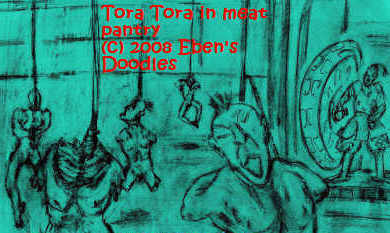
There were tablecloths from the captain and officers' tables in the other room, which he got and then used to cover the bodies.
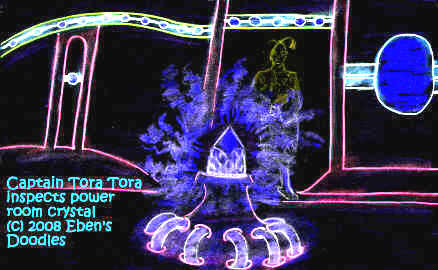
But he did not take up his philosophical thoughts, he sat instead and thought of his prospects, while the ship left Nergulia far behind and, increasing its velocity just beyond the speed of light, hurtled toward the middle and outer rings of the Universe exactly as he had just directed.
All he had said on entering into the chamber of the guidance and power crystal was, "Take me to the blue water planet we last visited," which, of course, was Earth II.
He knew of no other planet he wanted to visit as an uninvited guest. They were all too big, or too cold, or too hot, or too populated already. The Blue Planet was like a jewel in his mind. Yes, it had some specific problems. One was its inhabitants, who though not too numerous registered a distinct dislike and suspicion of anything or anyone alien. He had not been able to show himself, of course, to the various inhabitants, particularly the human race. His nose, feet, and top knot and other aspects of his body immediately identified him as an extraterrestrial alien to them--and they would become either afraid or fierce and warlike, and then he had to leave them immediately or fight with them (for even the fearful ones could easily procure professional armed soldiers who would then fight to kill him).
He had visited Earth II with the Nergulian probes, and on one, when no one aboard could decide who was best to send forth to spy out human society, he saw immediately that he could do it, since he knew all Nergulians hated deep masses of water, much preferring the deserts and high rocky regions and dry caves to all that wetness of the Blue Planet. Yet the Nergulian nose was best suited for immersion in water, he had discovered. How could that be explained, since Nergulia was so barren and waterless and mostly barren rock?
He knew he could deal with the water that lay across most of the planet as no other Nergulian was prepared to do. For once when he was an adventuresome youth careless of his life he had deliberately held his head under water in the daimyo's palace pool, just to see how long he could do it without stopping, and that was how he found out his nose was wonderfully suited to being under water for long periods. It closed shut perfectly without even having to think about it, sealing him up, and his eyes could see very well too under water. If only Nergulia had pools large enough, he could have learned to swim like a cave fish! But there wasn't enough water, only the underground streams that flowed intermittently in the rocky mantles of the planets, producing a little, shallow pool now and then, but never anything larger that a man could swim in.
With no inbred Nergulian terror and loathing of water engulfing his whole body, the aquatic, seal-like Tora Tora volunteered to the ship's captain, and so he was sent to spy out the city of the humans, and he did his task successfully and returned to his ship. Everyone was amazed at his ability to navigate in such an alien, unpleasant element as water, keeping beneath the surface for long periods as he swam from place to place.
Now and then, as in the canals of the big human city he found, he rose to the surface to observe the surrounding and the ways of the inhabitants. The humans were fascinating subjects to him for a number of reasons.
Unlike Nergulians, they raised their young outside their bodies, without the use of warm, protective belly pounches. Defenseless without exterior built in weaponry, they possessed no poisonous spurs on their heels for use in kicking one's foes in the face or neck. They also could not leap and run as fast as Negulians, and liked to wash their entire bodies frequently in water, using a brush and a bar of yellow fatty nature that made a kind of foam when rubbed. Never did a Nergulian apply water to his entire water if he could help it--as too much was considered a danger to health and might drown his air-breathing skin and asphyxiate him. That idea, of course, was disproved by Tora Tora's own experience, but all Negulia believed it, and could never be dissuaded if he tried a hundred years, plunging himself in baths of water and showing a prolonged exposure to water on his entire body surface was not harming him the least bit. He could understand that the females might be terrorized by water, fearing their pouches might fill and drag them down and drown them--but the males--they had no such pouches, of course, and could easily move about in large amounts of water, swimming like the fish--if they could only overcome their instinctive dread of water!
Yet humans were a most interesting case--how could such a species survive and multiply its numbers successfully? It seemed so disadvantaged compared to Nergulians, in his opinion.

After the collapse of the hitech, geodomed Crystal Age in 2170, the blue water planet spiraled backwards in technology, rather rapidly, with all sorts of steam engines dragged out of museums to do the heavy hauling work of a mostly agrarian and pre-industrial society. By the 23rd century, in the middle part, a race of humans called the Dutch managed to eke out a precarious existence in North America and the Caribbean and the northern coast of South America, re-creating a revived Dutch colonial empire of sorts. The glaciation, however, continued to drive agriculture and civilization southwards, and even the stubborn, tenacious Dutch could not hold on indefinitely to the more northerly portions of their realm. Yet for a century or so they seemed to be holding their own, even in the teeth of the inexorable advance of the New Amsterdam glacier and ice sheet. Bridges were not something they could afford to rebuild, however, and the amount of traffic did not warrant the expense any way. It was more economical and practical (solid Dutch values in Holland America) to tow an engine across the Hudson or any other major river rather than construct a railway bridge. Cars could be picked up or dropped off on either side, and the goods could be shipped by boat from those points as needed. Or the boxcars could be towed across, if the business made it pay.
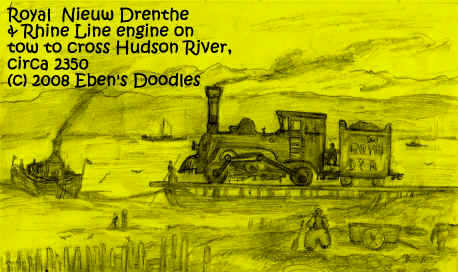
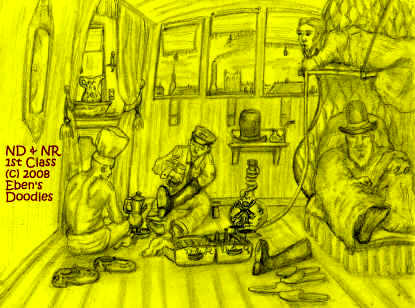
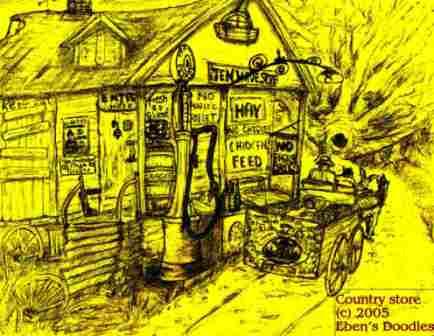
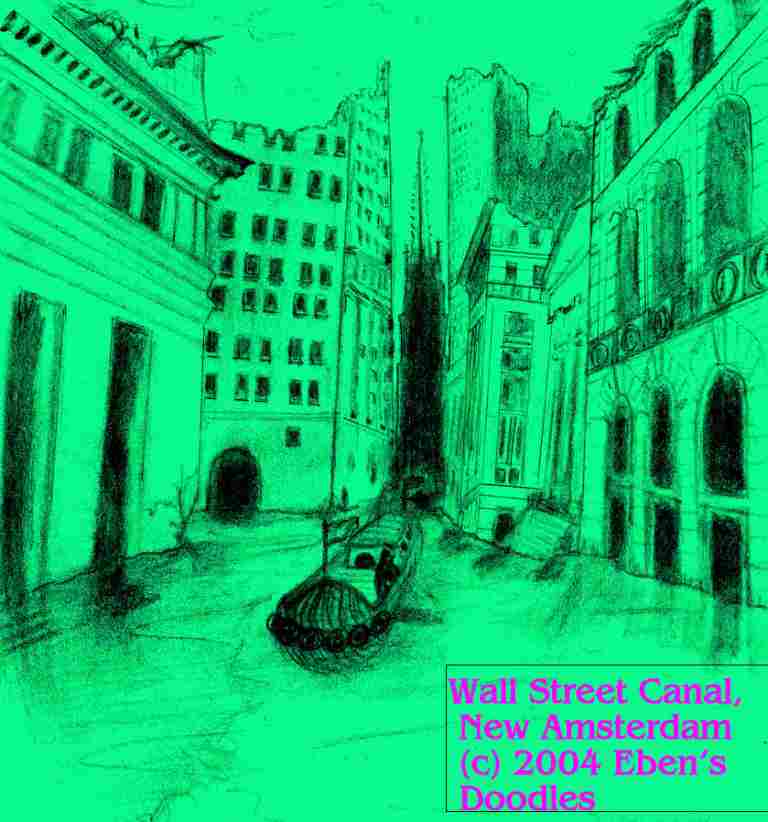
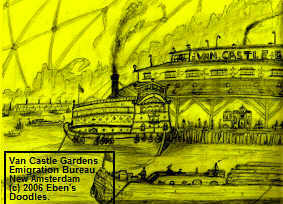
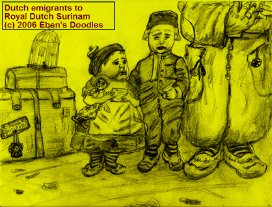
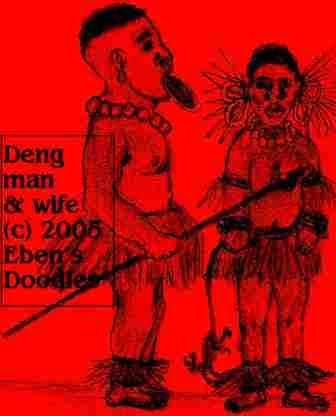
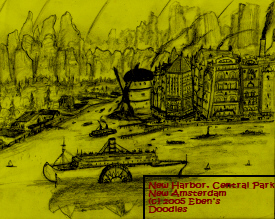
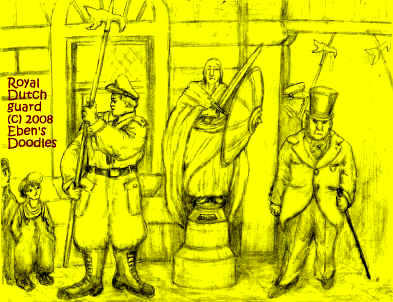

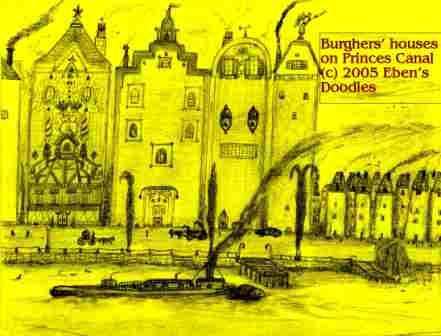

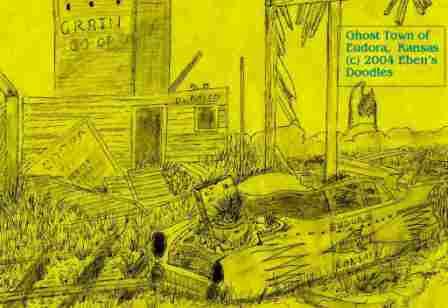
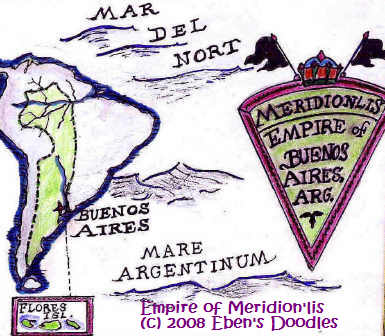
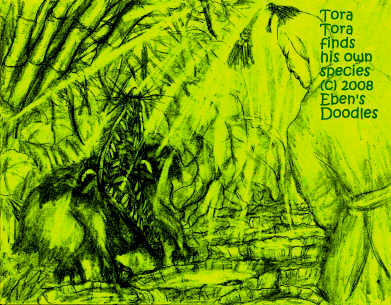
When the trajectory was traced out completely on the ship's viewing screen, which the crystal filled with all sorts of pictures, the planet was seen again, resting beside a glowing solar cloud in an entirely different sector of the Universe, and it was a bluish frozen planet, only it was already beginning to thaw out and even show signs of life on the surface.
So the inhabitants and the creatures of Earth II had not all perished in the re-location! This news was most remarkable to the Nergulian probe, and it was forwarded back to the Nergulian shogun, who decided to continue exploratory contacts with the Water Planet, as it was called, in the future. As to just how the planet was moved, there was no data available to determining the source of the required propulsion. That question remained to be determined later.
Understandably, there was time now to reflect upon the past circumstances, the philosophical stands taken, that had brought the prince to his present position of captain of a speeding starship headed to the Blue Water Planet shining like a jem in its new home.
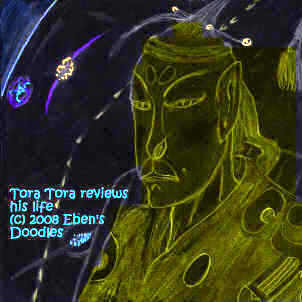
Except for some stowaway Nergulian cave rats and numerous smaller vermin such as cockroaches, lice, and bed bugs, Tora Tora was the lone living Nergulian on board. He could not choose even one from among the disciples to be his retainer, lest he give shame of face to the others for not deeming them worthy to attend him on his long voyage. That was unthinkable to Tora Tora-sensei, to demean any of his devoted disciples that way. They were all, equally, noble shishi in his estimation. Best leave all, deeming them all worthy of their decision to carry on his legacy of freedom as best they could, though they might have to do so as slave labor in the mines of Ner-Gul's Eye to the times of their deaths and being eaten.
This left Tora Tora exposed to the sheer loneliness of the voyage, without a single Nergulian companion. Yet he soon found he was not alone. He felt a distinct presence. It seemed there was Someone else aboard. Who could it be?
The powerful Presence he felt aboard his ship the moment he entered, which he could not track down but which stood even now beside him, was again making its existence known to him. He did not sense it was hostile. Rather, it was encouraging him to go forward to the Blue Planet. What destiny awaited him there? He had no idea.
He looked around, rose from his seat, and then went to inspect more of the ship. He went from one side to the other of the double hulled, catamaran-type ship, crossing the connecting bridges, looking closely at everything once again, wondering if some stowaway were hiding aboard.
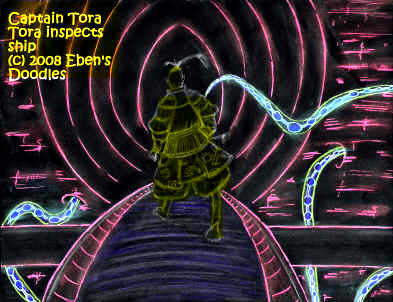
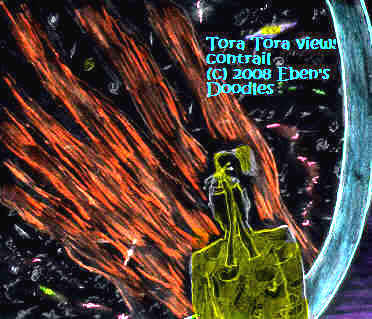
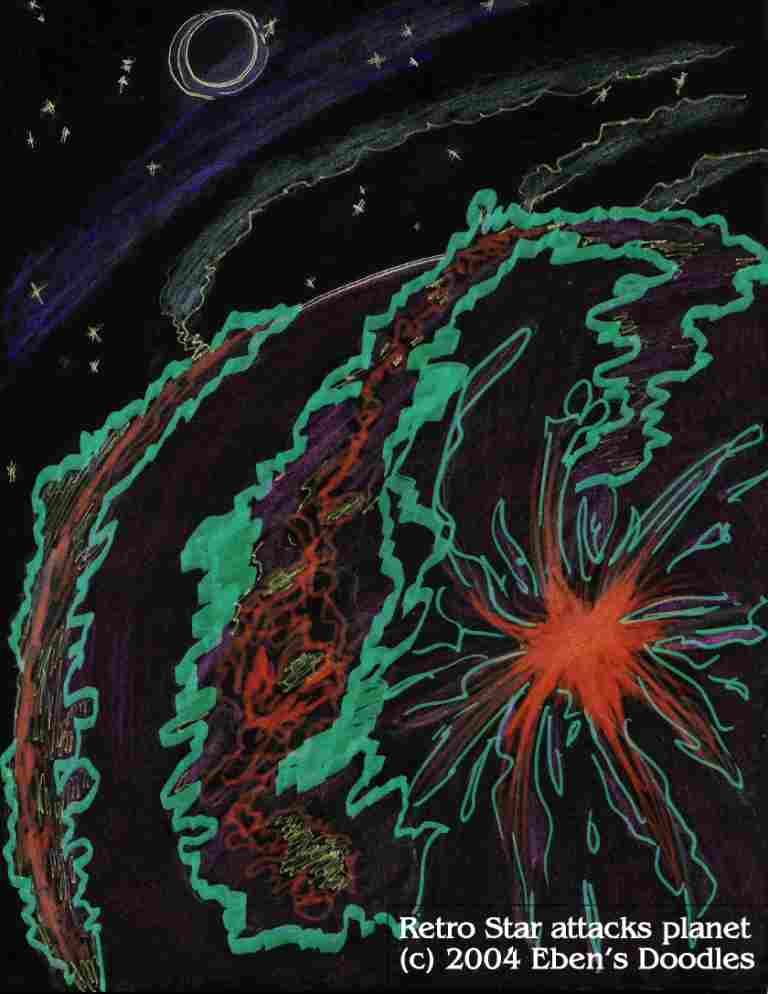
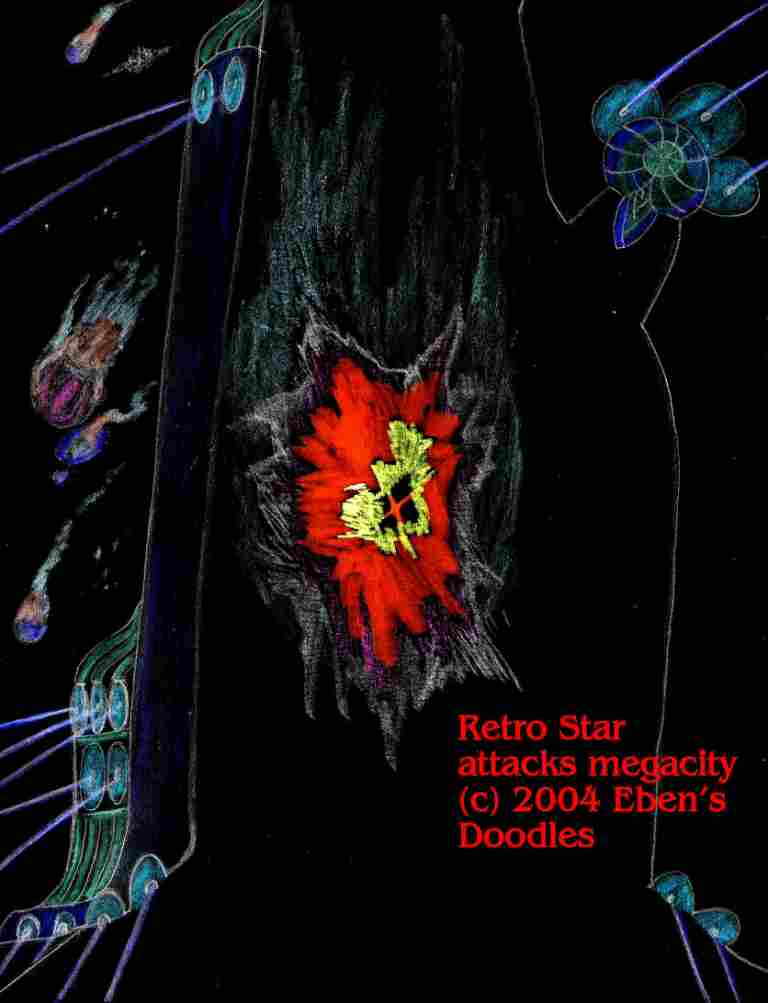
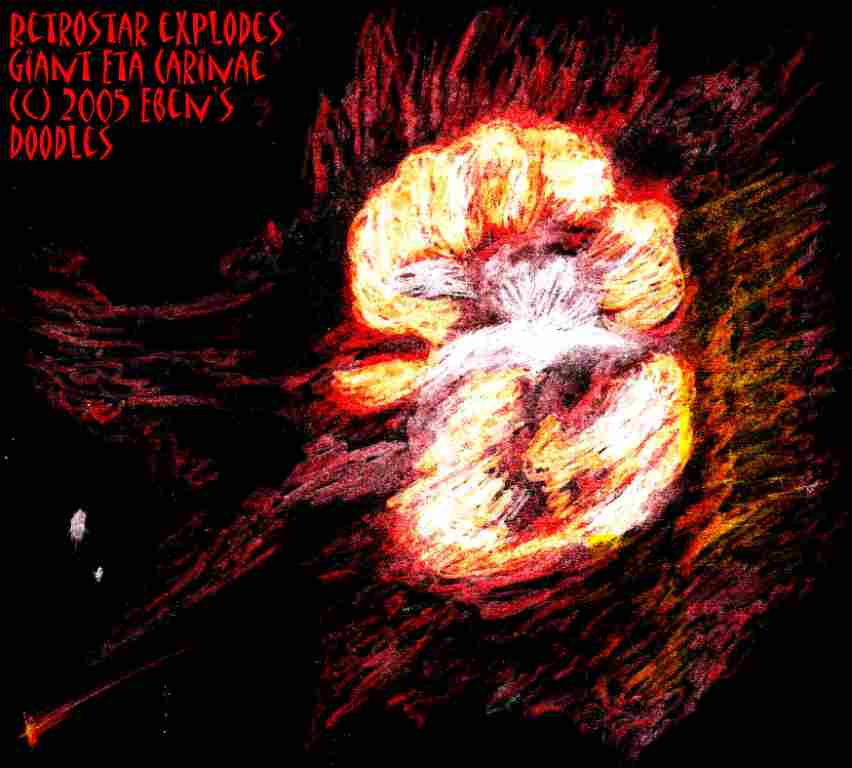
He also continued to review his life, and what it produced, for good or evil. How could good intentions produce evil--which he had seen happen in his case. He has produced much hunger and suffering, all because he had acted to free his people from slavery and millennia-long oppression! What a tragedy! But he could not deny it. Freedom produce suffering, even death? Yes, there was a tremendous cost to freedom. Freedom did not come cheaply, with no sacrifice. But could he ask others to sacrifice for it? Should he not pay the entire cost himself for their freedom? But how could he do that? His one death would not bring freedom for all? He would vanish, and the tyranny continue as before, even strengthened with his absence.
He could not solve this dilemma at the present, so he went back to his Ninjo-to training, his sword dance, to clear his muddled and painful thoughts away a bit.
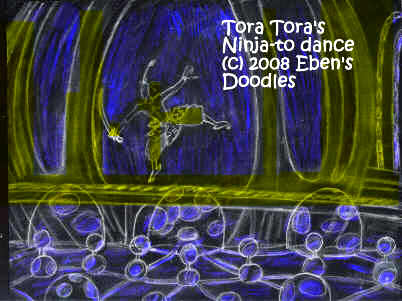
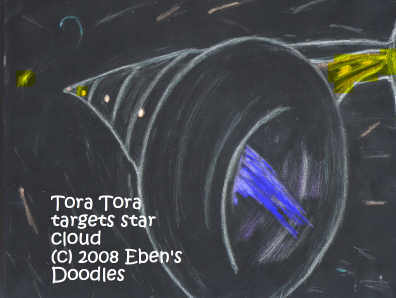
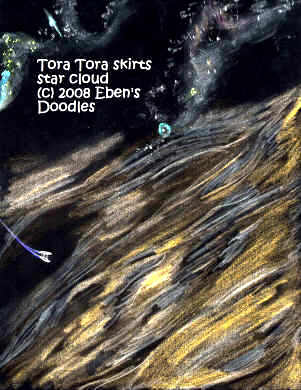
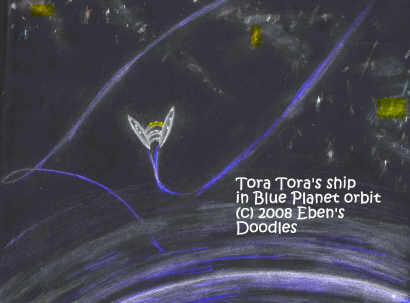
It had to have been the Presence he had felt so strongly on the ship during the flight, for now again it pressed on him heavily, as if impelling and even guiding his steps. He left the shuttle, wearing only his inner ceremonial garment, with part pulled up to leave only his eyes uncovered, lest he be seen by any indigenous people and identified as an alien.
As he made his way slowly down from the icy flanks of the great mountain, he encountered people--a caravan of sorts, that was making its way slowly round the base, toward some distant city. The rivers were available, and they used them, rafting and boating along them, in the passable stretches. At other points, they had to leave the water and climb along the rocky shores until the dangerous rapids and falls were circumvented.
At one such portage, Tora Tora encountered a lone young man frying a fish at a little fire, mostly glowing embers, set beside a rushing mountain trout stream. The youth did not seem surprised when Tora Tora approached, and so the prince sat down and waited. The meal was done when the youth spoke to him, indicating the filleted fish. Tora Tora nodded, and the youth handed him the fillet at the end of the stick, and the prince took a part of it, bowing and returning the bigger portion.
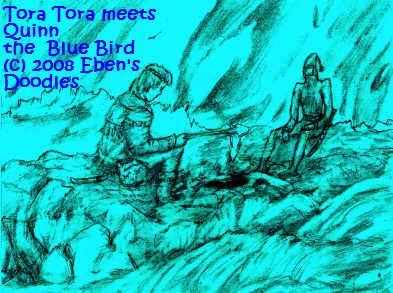
The time with Quinn proved most encouraging to the prince, as he faced his duty and resolved not to shirk it. The Five Blue Starred One had some counsel to give the prince, which he badly needed. Also, the special healing gift, which he could administer with a simple touch of his fingers, communicated more to the prince than his words, and he felt touched to the core of his being. It was so powerful, in fact, he sank down to his knees.
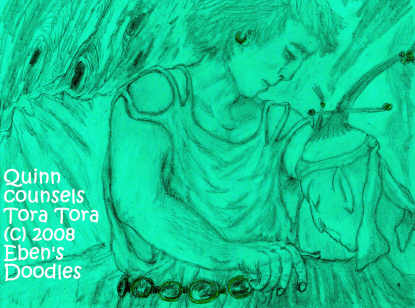
The Blue Stared One accompanied the prince to his shuttle, after leaving his leather jacket at the camp due to the heat his now glowing skin generated. The Blue Starrred One's skin, hair, and the mutant, radioactive stars in his hair shone all the more brightly as Tora Tora embraced him for the last time.
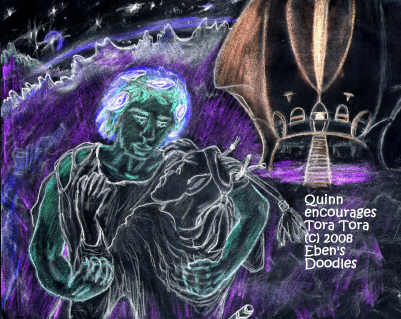
Quinn the Alphabetic R-Letterman and champion watched his newfound friend launch the shuttle.
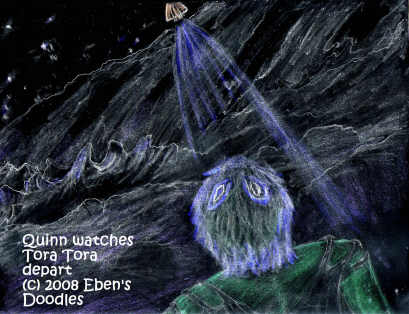
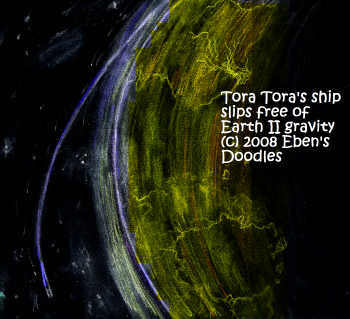
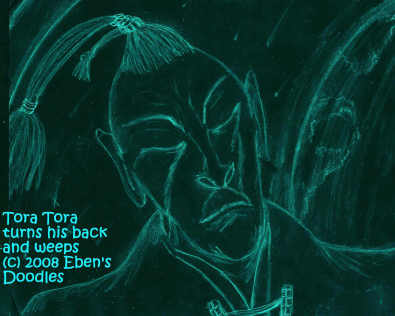
The Blue Starred One had asked Tora Tora to remain a while and travel with him in search of Yeshua. Would he?
He might have leaped at the opportunity to join forces with such a one as this man, whose eyes seemed to see through everything, and whose hands gave him such peace with a mere touch, but he felt checked. Was it his place to be this man's companion? he had to ask himself. The Blue Starred One had already told him how persecuted his own people were, and despised in this far northern country by the people and their ruling priests. Then the Blue Starred One could not show himself in the night to the inhabitants, lest they think him a devil and an infidel and stone him. Only in the daytime could he go with his head uncovered, and his skin visible.
Moreover, what if these people of the north discovered the Blue Starred One was accompanied by a traveller from worlds ringing an alien star? Surely, both of them would be stoned on the spot!
No, he signified, in the way of humans he had observed. He could not accompany the Blue Starred One on the last part of his spirit-quest. It was better that their journeys remain separate, he realized.
Tora Tora now looked ahead, to the time when he would be landing back at Hagi. What kind of reception could he expect to receive? Surely, the Tojogawas would not be pleased by his return, and seek immediately to capture and put him to death before he could reach any of his followers.
The new Shogun--for there had to be one in power again--would no doubt have the emperor in his clutches, and absolute power would be his to wield over all Nergulia. What could he do against him? Wasn't his return a last useless journey? It could serve no purpose.
Yet he felt impelled to return, nevertheless. The same Presence that had presided so strongly and palpably on the journey to the Blue Planet now impressed upon him to the same degree that his return was for the good. Something good would come of it! But what?
His hope and expectation reviving, when it seemed to have perished, was a surprise. Could it be that the shogun would be overthrown? Had the people woken up, seeing that they were enslaved as long as they resigned themselves to being slaves--and broken their shackles on the heads of their oppressors? Had the revolution already taken place during his absence?
There was no way to tell. He could only find out by seeing how he was received. It would take the form of either an attack or a celebration.
Yet as he neared his natal star system, the prince sensed that he would not be received with anything approaching a celebration--rather, it would be the reverse! There had been no revolution--successful, that is. Things had been been forced by brute force back into the same ancient order of the past. Nergulia was once again one vast prison-house, with the warrior classes serving the Shogun as his wardens and jailors and task-masters and showing no pity whatsoever for those they crushed beneath their boots.
The prince recalled his kempakus. He had written against the bat gods, Da-Win and Ner-Gul. They were no gods but cruel fictions, used by priestlings to enslave the people. This religion served the purposes of the State and supported the shogun's power which he had usurped from the emperor. Religion and State marched together, holding the people as their possession, to do with them as they pleased.
He had also written against cannibalism, which was the means by which the slaves themselves furnished a vital foodstuff to the meat-eating warrior classes. The tiger-yaks' herds had long since been decimated, and a remaining few either roamed the wilderness or served, defanged, to pull state chariots. His kempaku had erased the distinction between slaves and masters, the warrior class and the mass of Nergulians beneath them. That had led, unfortunately, to mass starvation, as the slaves abandoned the lichen-farms and food-gathering in the caves, and the warrior classes, who despised slave-food, or lichen, also felt the cruel pinch of hunger in the belly as they found the meat shops empty for the first time. If they had to depend on their own servants for food, they soon ran out, and then had no servants to do the work of their households. It was a universal crisis.
This crisis, Tora Tora knew, had not been resolved, as he had been forced to flee before solutions could be found in some re-ordering of the food system and getting the emancipated slaves back to work. He had thought of several ways it might be done, but his kempaku on the subject had been interrupted by his unplanned visit of mercy to the miners on Ner-Gul's Eye, bringing provisions to the starving laborers.
Hadn't Hagi starved too? He had taken most of the daimyo's larder with him-- and had not restored it?
The thought of the suffering of Hagi made the prince was almost unbearable. What could he do to make it up? How many people had died? Wasn't he the cause? He had to wonder if all his doing good, all his good intentions, had not produced more evil than he had sought to correct!
It was a hard light shining upon his efforts, but he had to face it, and not turn away in denial.
A lover of truth, he could not run from truth now. He had attempted to emancipate Nergulia, and Nergulia had been emancipated, briefly. But there had been no real improvement of the people's condition--something he had not included in his first calculations and philosophy.
Who could feed the people if they failed to feed themselves? Not the state, not the shogun--unless it were done tyrannically, with the whip and lash. The Two Pillars of Nergulian society were the warrior classes and the slaves. He had swept both aside, philosophically, planting Freedom in their place, but Freedom could not organize and feed the population of either class. They both starved to death.
All he had was a lofty ideal, he realized. Reality was crushing it even now, stamping it out of existence.
The prince gazed blankly into the ship's viewing screen, unaware at first that it was showing his home planets and stars.
The slowing down of the ship and the abrupt ignition and thrust of the rockets that was slowing the starship and easing it toward either an orbit or a landing brought the prince to awareness of where he was. It was time to make some decisions as captain!
If there was no revolution, what was the best thing for him to do? Surrender? Let freedom die with him, the last emancipator Nergulia would probably ever know? Or land and seek out some cave where he would be free to carry on as an insurgent? No doubt he could attract a following again, this time of fighters, not students, and they could strike at the Shogun's forces, then run and hide until it was safe to come out again, to make yet another strike. But what good was such a life? They would achieve nothing worth-while, if he descended to the level of a disgruntled, out of work, patronless warrior and became one of the many bandits infesting the wilder parts of Nergulia.
No, he would not fight as an insurgent, nor become a leader of bandits. If he did anything, he resolved it would serve to destroy the Shogun's face. Only if his face were destroyed, would his power over the emperor and the people be broken forever. But the prince knew this could not be easily done. The shogunate's armies could not be defeated, except by a very large force, and the prince had no such resources to mount a winning offensive--having no army, no weaponry, nothing but this one starship.
Yet his kempaku had not destroyed the previous Shogun's face--the shogunate had revived in all its old power under the succeeding Shogun.
A lightning bolt seemed to flash in Tamemoto's mind. He saw for the first time what he must do. Yes! he thought, springing to his feet. He strode back and forth across the bridge, ignoring the view screen, as the thoughts raced, and he considered the consequences. At last, he knew his purpose in returning--it had been revealed, just in time!
He arrived in the outer atmosphere of his home planet and found no resistance, there were no starships waiting for him, to blast him to a cinder. Even if there had been, they could not have known his entry point, which he deliberately changed as he issued rapid orders to the power crystal.
Under full power, the ship, instead of reversing its position and landing, raced directly at the Shogun's castle city and its old defensive walls and towers set beneath the great Atlantean dome.
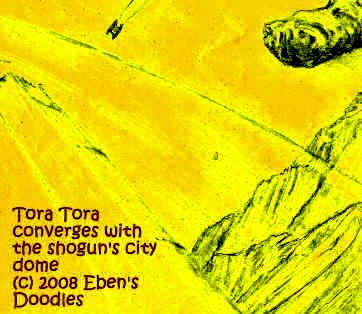
He knew what he was going to do in his remaining moments of life. The shrine's fiery destruction would signal the end for the Shogunate, since the shrine's loss would inflict such crushing humiliation to their face the Tojogawas could never show themselves in public again. The shrine was thought inviolable, defended by the whole fortress and its castle militia, in which it was set at the center in its own court, with the First Shogun's sword set on one pillar and the First Emperor's jewel on the apex of the other. Without this shrine and its prestige and cultic charisma, there would be no Tojogawa shogunate, as it contained the worshipful skulls of all the first shoguns, each containing the writ of an emperor authorizing the transferral of imperial power to his Shogun's handling). But thanks to the Atlanteans, Tamemoto the Tiger Prince grasped a most deadly sword in his hand, a flying Ninja-to whose thrust at their vitals they could not possibly survive.
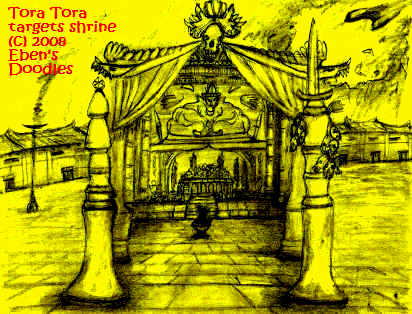
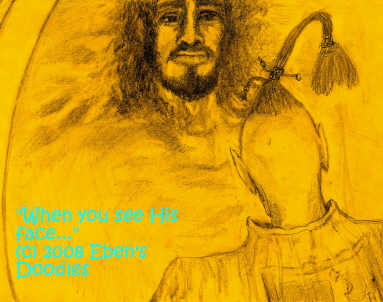
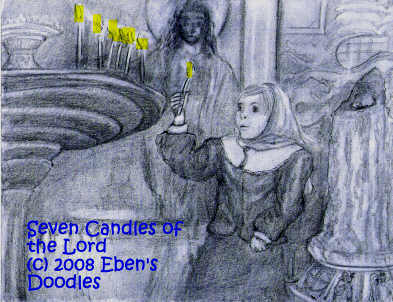
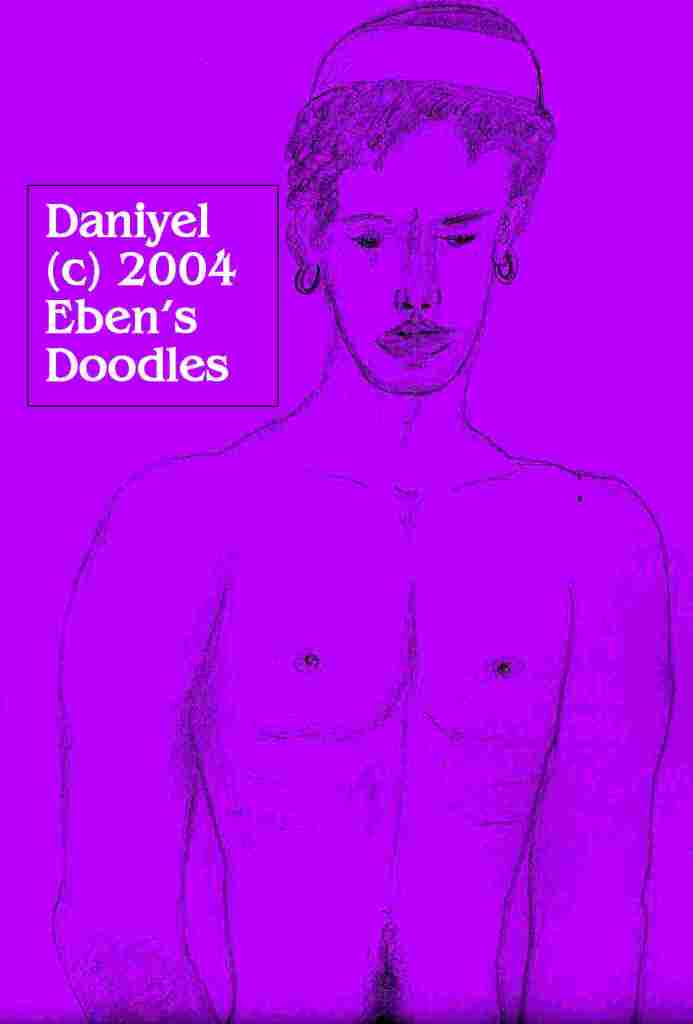
The Pea of Chezib (U) was a most unlikely candidate, in appearance and equal in ferocity, as he looked more like a marsupial Tasmanian devil than he did the offspring of a human mother. But as that was the only human part of him (his mother), it is understandable how terrible he turned out. Just the same, he fought a truly horrible species, the arachnid race of the Algol who had invaded Earth II under the allied banners of the Atlanteans and the Sapphire/Poison Frog and even the Nergulians--and sometimes what is horrible is the means to deal with what is just as horrible.
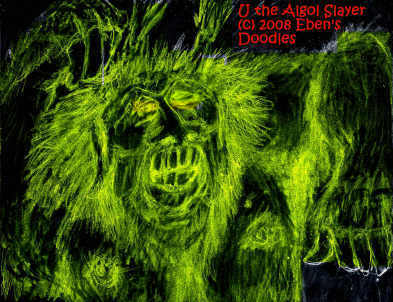
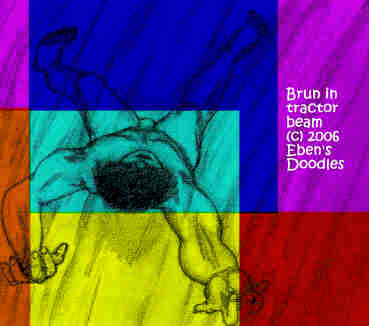
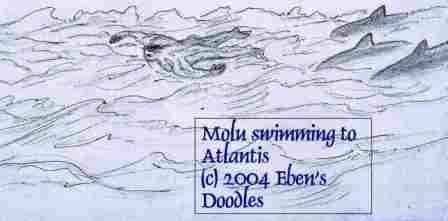
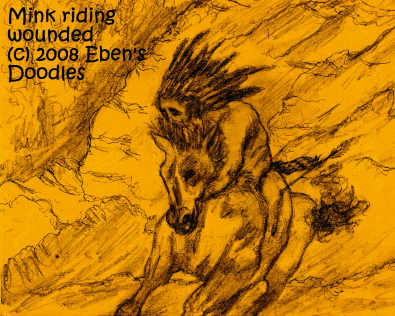
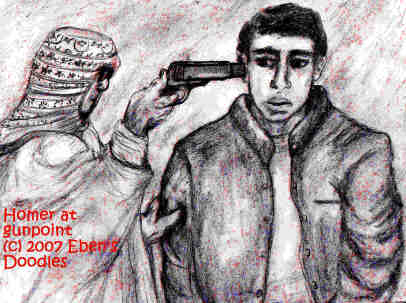
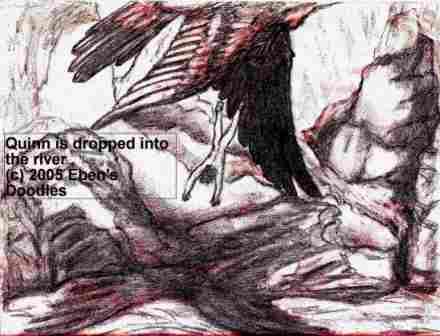
All these considerations flashed through Tora Tora's mind while he was viewing the various champions and star-challengers. And why was he being shown them? Was it not, he thought, because he was going to be presented a particular choice by Yeshua? After all, he hadn't really known what he was getting into when he joined himself to Quinn Ceylon the Pilgrim and Spirit-Questor. He had thought it was for freedom and brotherly union in the struggle for freedom--but perhaps there was a wider struggle going on, one which he was now being shown?
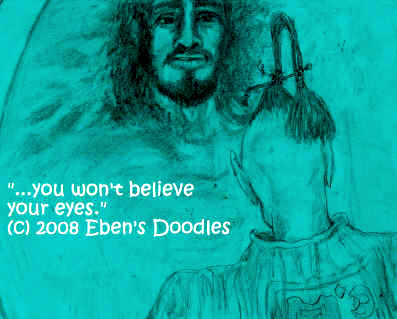
Suddenly, as he thought this, he realized that Yeshua was infinitely greater. New images flooded across the viewscreen.
